NION Berlin’s bright logo is a dot on the map, drawing attention to Berlin’s Moritzplatz, as curious neighbours glare through the sweeping windows of the project workspace. A Google Maps search titles the location ‘A Japan Experience’, referencing the travel agency that still resides in the back. Yet rising up from its Japanese pop-up store is an ambitious plan to change the way that people live and work together.
Words
Photos
Valentina Culley-FosterInspired by the ancient and modern traditions of its Japanese co-founders, NION Berlin is a developmental project with the establishment of a holistic urban quarter as its goal. A model of responsibility, the living quarter proposes a more harmonious way of integrating and innovating into the natural environment. The focus is on sustainable approaches related to both the infrastructure of NION, the management of resources like energy and waste, and the entire community philosophy.
The 90,000-square-metre living, working, and ideation space will provide Berlin’s most curious inhabitants with a smarter way to live, and a micro-community on the city’s riverbanks. The plans include a downtown-feeling commerce centre with Japanese cuisine and shops, an innovation technology hub with a fabrication cafe and collaborative space for environmental solutions, a residency programme offering traditional craftsmanship techniques from Japanese masters, a collaborative arts centre and events facility, and a Dojo and Sento health centre with an apprentice programme offering traditional remedies. All this will be part of a gender- and age-diverse 400-person residential area integrating with local flora and fauna to offer a communal life–work balance. NION Berlin wants to be exemplary as a sustainably minded village of social innovation. With its approach, the cluster city proposes itself as an experimental laboratory for addressing the city planning challenges of the future.
The focus is on sustainable practices and ‘bringing people with different agendas together as a method to foster creativity’, says Ryotaro Bordini Chikushi, co-founder and CEO. With its expansive and detailed square metres of ambition and a philosophy internally described as ‘perpetual care’, the block is visionary, down to the management of its language, carefully cited by its Chief Community Catalyst (CCC), Naho Iguchi.
'When we say its an urban development project, it has to be holistic, it has to be an ecosystem.'
Following a few strides up the steps of the NION space, you can choose from one of the dozen pairs of indoor slippers lining the entrance. There, once inside, you might even meet the smiling, youthful Ryotaro yourself. A cultural hybrid of Japanese and Italian descent, he calls himself a ‘crossbreed runner between research, strategy, and production’. NION Berlin is possibly his biggest undertaking so far, but nowhere near the first. A true serial entrepreneur, Ryotaro’s pocketful of projects have already helped to nourish numerous cross-cultural exchanges in Europe and Japan, touching creative and business industries alike. Besides his rare Japanese vinyl shop, Mion Records, he is also the co-founder of greenbox, providing ideation space for infrastructure and energy professionals in Berlin. The idea has already caught on internationally, with countries such as India, China, and Japan looking to set up their own.
‘With the pilot project of greenbox, infralab, we have nine partners’, explains Ryotaro. ‘From public transportation, waste management, electricity grids, energy supply, gas, water. These nine heterogenic companies found their roundtable at infralab, to find common denominators among them, to create holistic approaches, to create a better Berlin. It’s not all about “smart-ness” but about a holistic approach to the problems or solutions we have today for a city.’
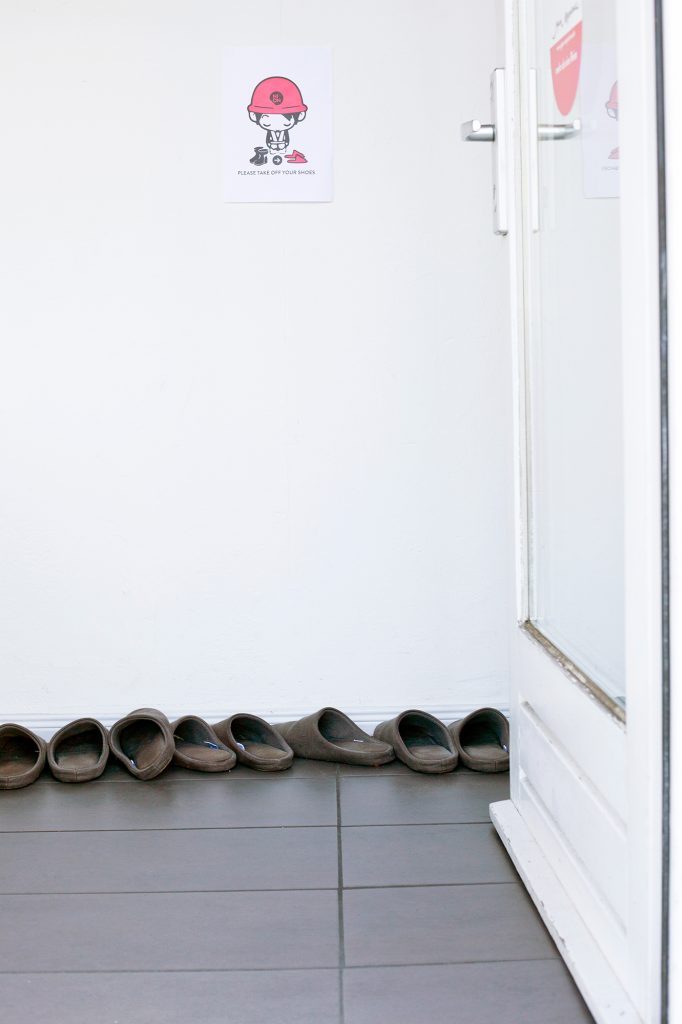
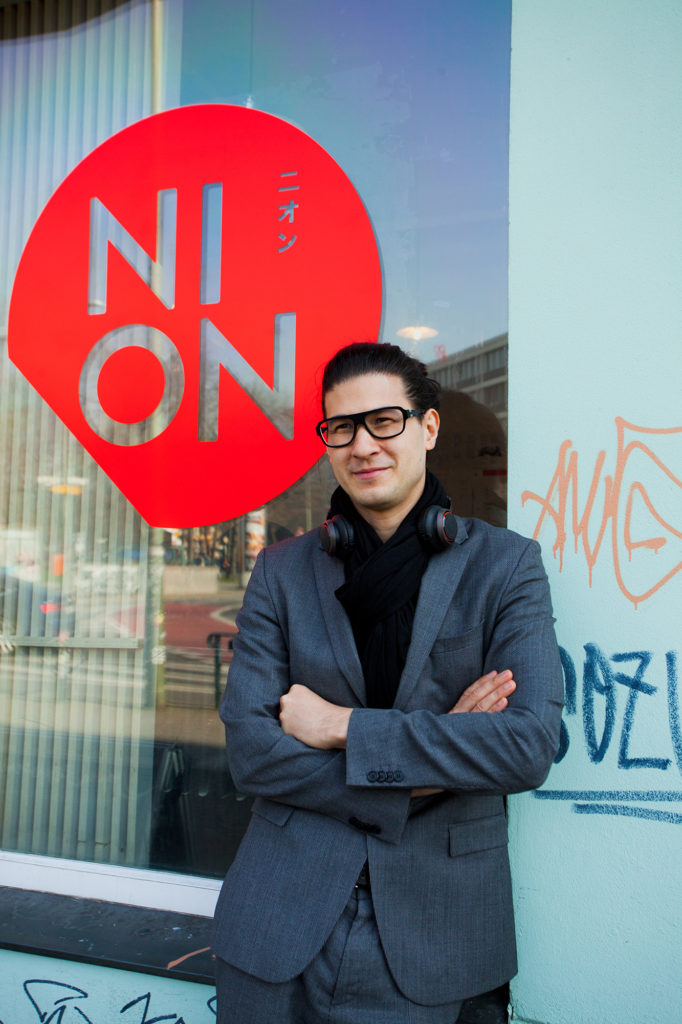
Ryotaro’s technical and collaborative competence is essential to the foundation of NION, with all of its participants contributing to a responsible ecosystem. The team is versatile, with strong players supporting its constituent pillars of business, technology, culture, and communication. Their approach doesn’t exclude the community at large, however, aiming to invite other visionary experts on board, be they designers, architects or gardeners.
And this is no ‘Japan-town’, Ryotaro assures us: NION’s focus is integration. ‘It’s not about building a UFO in the middle of the city, an alien piece, but its really about something that is fusioned into the city, or grown out of the city.’
NION has four main founders, with two taking an active role and another two advising. ‘I’m the Chief Eternal Optimist’, he laughs. ‘So I’m more on the business side of things. You always have multiple roles, but you have a part where you do the heavy lifting.’
Naho Iguchi is the organisational psychologist and former director of TEDxTokyo, who is sitting close to Ryotaro as he speaks. Here at NION, she is responsible for the community building and team ethic, reiterating the value of each individual and NION’s pledge to have a work environment free of power dynamics and hierarchies. Ryotaro and Naho met just five years earlier through a mutual work acquaintance, and Ryotaro remembers his first impressions: ‘She was telling us what she does, and that she was a walking, living, sculpture…’
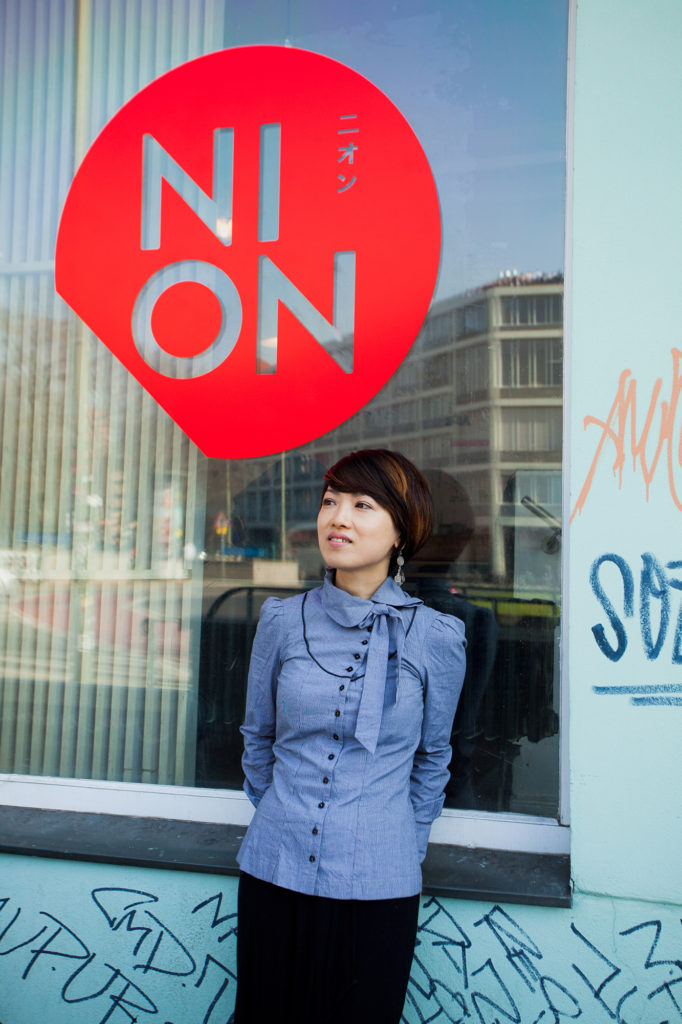
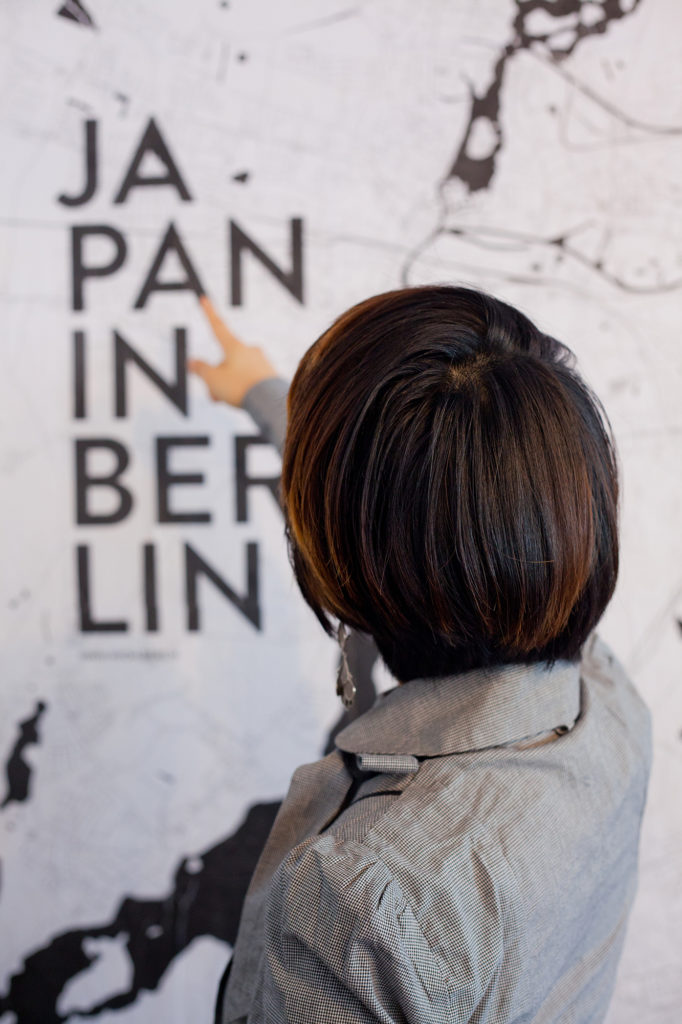
Naho cites progressive self-management concepts such as teal and Holacracy as the benchmarks for team culture at NION Berlin, with transparency and self-organisation significant for the organic growth and structure they seek. Her focus is on the human decision-making process, and she believes that any human activity is an act of art, ‘such that it consciously aims to yield new culture’. Naho is also in charge of fuelling the momentum that will further populate and ‘animate’ NION, allowing residents and visitors to feel included while contributing through their individuality. This process involves hosting community meetings, developing the language reflective of NION, and keeping everyone mindful of the greater ethos of transparency, accountability, and inclusion.
The two other founders have helped revive Berlin’s sleepy quarters over the last decade, and offer their valuable experience as counsel. Andreas Krüger is the former carpenter-turned-developer who has overseen the development of Kreuzberg’s Moritzplatz since 2007, housing the art mecca Planet Modulor, the green Prinzessinnengärten, co-working BetaHaus, Open Design City, Just Music, and many more. NION’s CFO is Andreas Foid, accomplishing the refurbishment, revitalization, and planning of Kreuzberg’s Markthalle Neun, one of the dying 90s market halls of Berlin and now a foodie hotspot that brings handcrafted regional food stands to 15,000 visitors every weekend.
NION’s roadmap to fruition projects a public launch in the year 2020. As the planning continues, Ryotaro looks to the achievements of local establishments for inspiration. ‘Holzmarkt is what comes closest to what we envision with NION. Holzmarkt started with a club, the club became a sauna, then lots of trailers came in, and then they had a little hotel, a restaurant … That became something really iconic and representative of Berlin.
‘When you see something like Markthalle Neun’, he continues, ‘it’s actually a very Japanese style of doing things. Basically you have lots of small stalls, food stalls with high-quality food. It really revolutionized the development of food culture in Berlin. The success story of it is that it’s the small things that matter so much. Everything was movable and content was king.’
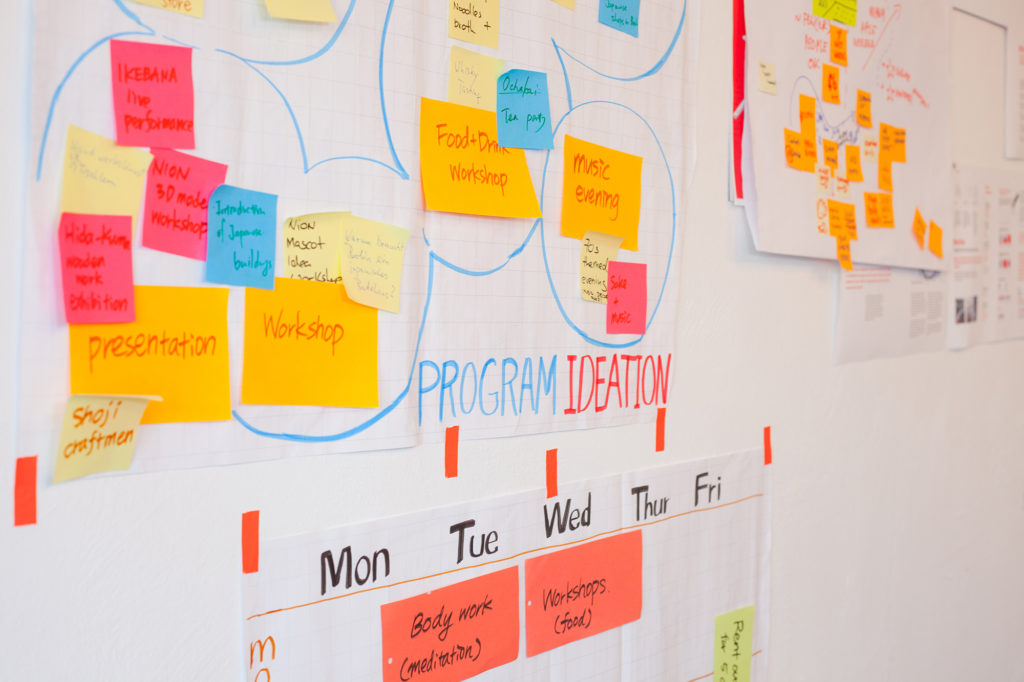
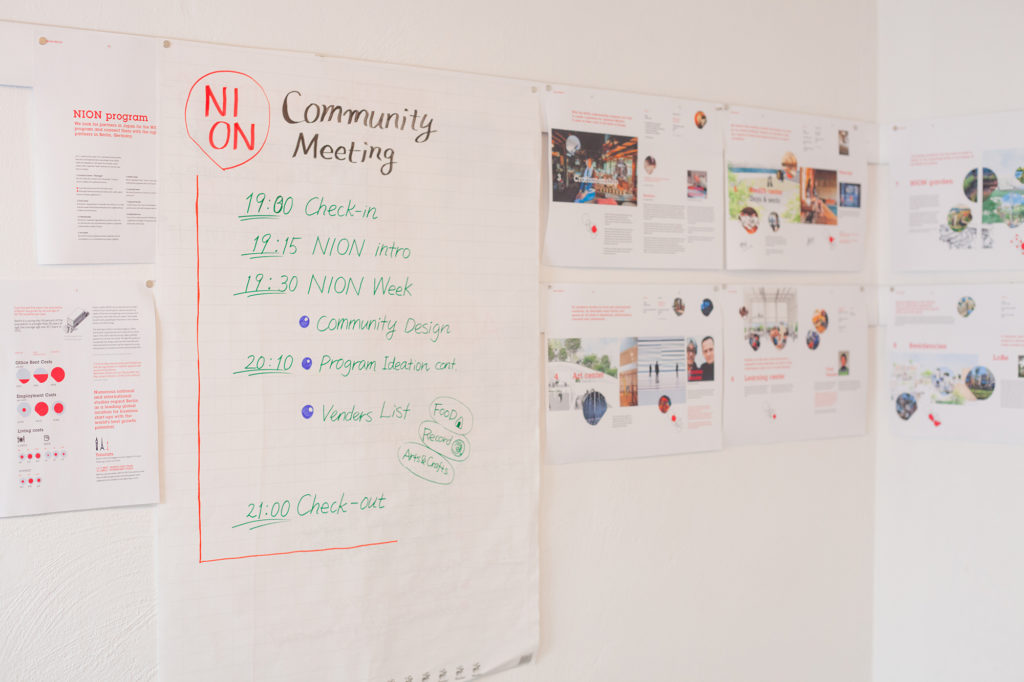
The project is just two years into development, but bold, with an interested team of specialists extending well beyond the core team of its founders. Although the NION team is hesitant to reveal the pending names in progress, a Japanese architect and several cross-cultural scholars have voiced their interest and support. With its open-door policy, the NION brainstorming office continues to hold weekly meetings for those in the extended community looking to contribute their voices and skills.
The name NION, Ryotaro says, alludes to its incidental evolution from the branding colour scheme, consisting of a bold logo made to stand out in neon. Plus, “Nihon” and “Nipon” both mean Japan. Ni has the connotation of two … ‘In this case it’s the European culture with the Japanese culture, so that’s how we saw it.’
‘It’s not about building a UFO in the middle of the city.'
Architecturally, NION’s living-quarter design is inspired by the Berliner Mischung concept. The 250-year-old idea combines residential, commercial, and productive spaces within one town block to stimulate its inhabitants both culturally and economically. Ryotaro’s definition is even wider, calling it ‘a new model of life in the urban environment’. He repeats that ‘it has to be holistic, it has to be an ecosystem. So, it has to back all of the factors that we consider important in life. It’s about learning, it’s about working, it’s about health and fun and entertainment. And of course – what’s really at the core of it – it’s about living.’
Within NION’s infrastructure, the operating technology reflects its conscious and sustainable choices. The planning of facility services and energy management includes reusing food not used in restaurants, waste collection with emission-free vehicles, storm-water collection, roof gardening, wind-driven building ventilation, hot-water generation via solar thermal elements, and the use of intelligent building materials. The important concepts come down to the localization of energy, and ‘making a resource of the waste’, says Ryotaro.
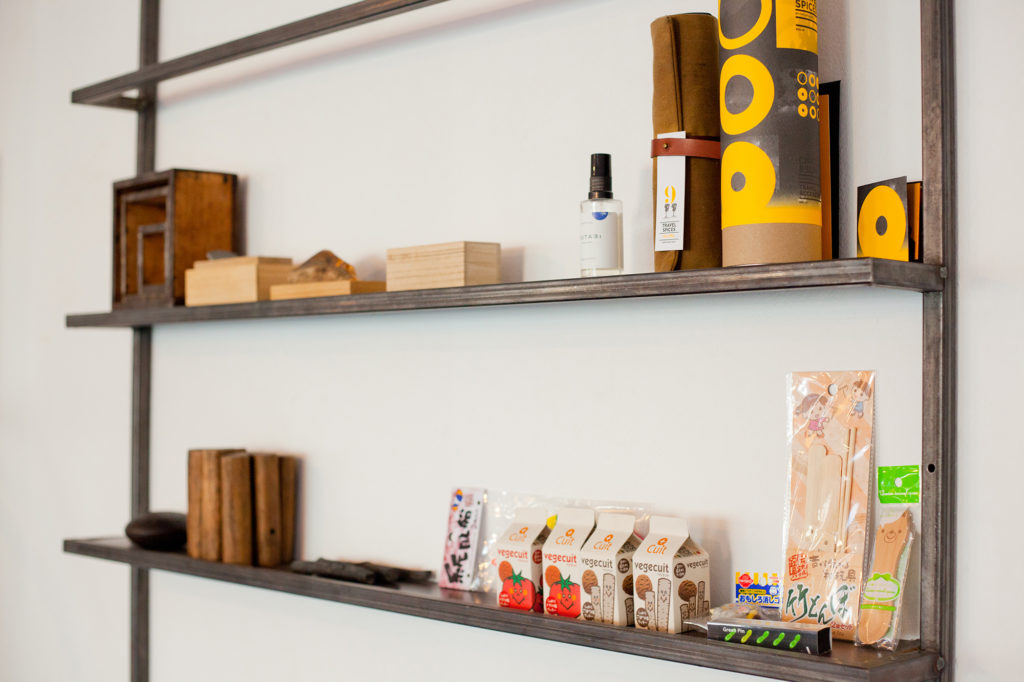
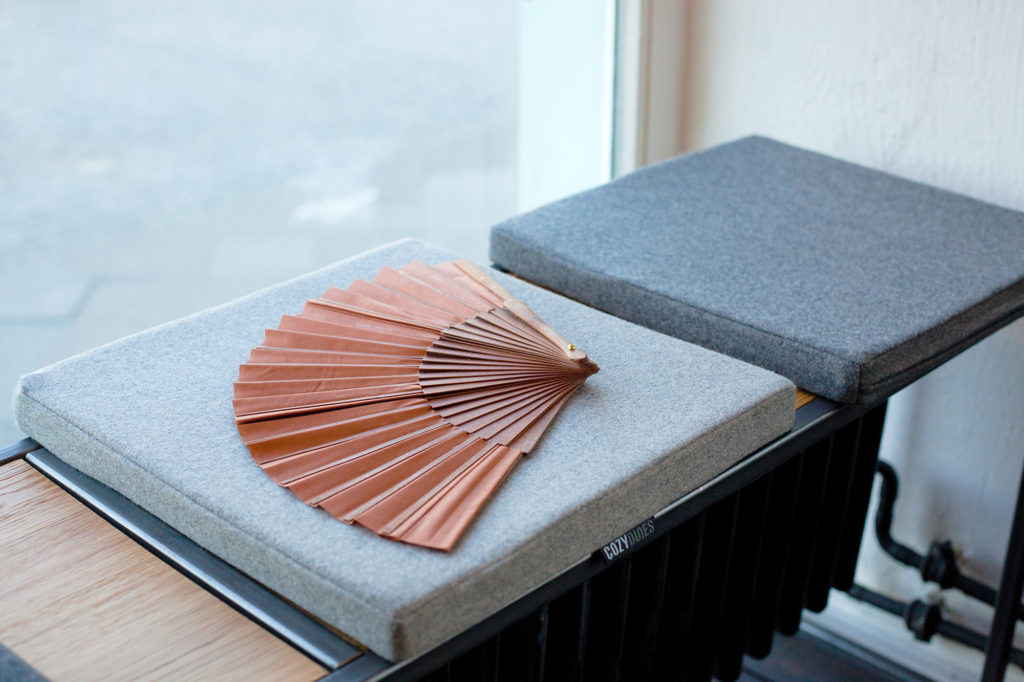
The scarcity of space in densely populated cities like Tokyo is also an inspiration for the NION Berlin project. The architectural considerations are sustainable, in that the aim is to maximise the opportunities of the available land. ‘Because you’re not wasting space, you have to really utilise and appreciate the space you have and you can access.’ Ryo continues. This does not in any way suggest a plan for industrialised urban gridlock, however. NION’s Japanese community garden will horizontally slope over annexing buildings, while also supporting Berlin’s biodiversity. Urban beehives can be erected, and bird nests can be integrated into buildings for winter stays.
Offering an alternative to a loaded word such as sustainability, Naho explains that internally, they prefer the term ‘perpetual care’. Suggesting that the word sustainability lies in the old paradigm, she aims to reinvent the mindset of those looking to apply conscious strategies to their everyday living. ‘We believe that we need a totally different perspective or starting point. It’s more like caring; it’s constant, ceaseless, it’s not planning ahead for sustainability but more awareness of everyday life.’ The aims of ‘perpetual care’ are preventative.
'How can we localise energy and how can we reuse the waste that we generate to create a resource out of the waste?'
The current trajectory places the NION team in the process of acquiring and purchasing the desired land. The team is aiming to secure an area directly on the Spree, close to several other cultural institutions in Berlin. With local and Japanese partners on reserve, NION is also researching land development and continuing to meet with local social scientists, architects, and designers who can help further their mutual vision. The team believes in the synergy between the two ‘sister’ cities of Berlin and Tokyo, as well as the creative support of the dozens of multinational influences that have made Berlin the melting pot and cultural mecca of Europe.
Naho mentions the closer milestone of the upcoming NION week, planned for September of 2018. Taking place between the multicultural Holzmarkt community and the NION work space at Moritzplatz, the cultural and gastronomic programme will serve to introduce the city to some of the Japanese partners, potentialities, and tease others to get involved.
‘The level that we are at now is very content driven’, says Ryo. ‘As you can see, the topics that we are trying to cover are very vast … culture, music, art, business technology, sustainability … for every part we need specialists and enthusiasts who will pioneer this project with us.’
Berlin continues to open its doors to many, with generations former and future growing inspired in its fertile and tolerant soil. Nurtured by citizens that are eager to innovate and grow, this is a city plan within a city, and an ecosystem for the future. NION Berlin is a living laboratory for living better. And with its values focused on attitude, content and freedom, NION is already Berlin.
More info about NION Berlin and their urban development can be found on their website and Facebook page.
